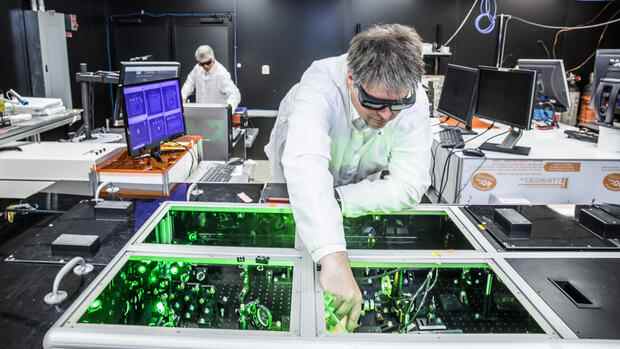Berlin Björn Manuel Hegelich had had the idea of making his very special laser research commercially usable for many years. Again and again he has refrained from doing so. “It’s hardware. It’s expensive. It’s not just an app,” Hegelich explains his reluctance. The native German, who has been a professor at the University of Texas for ten years, wants no less than shrinking the previously kilometer-long particle accelerators to the size of a room.
The 48-year-old was encouraged in his plans when he met the serial founder and investor Lukasz Gadowski last year. Gadowski is best known as a co-founder of Delivery Hero and, through his technology holding company called Team Global, as a backer to startups like Enpal and Choco, and aerospace companies like Volocopter and Zapata. “He was extremely enthusiastic about the idea and ready to provide the seed capital,” says Hegelich. Now the professor is presenting his company to the public for the first time.
Gadowski invested 15 million euros in the start-up called TAU Systems and founded in 2021. “My mission is to invest in technologies that make the world significantly better and create sustainable value for our society – TAU is an excellent example here,” says the Californian by choice. The new generation of particle accelerators that TAU Systems is developing will soon become indispensable in science.
Hegelich also sees Gadowski’s commitment to such a capital-intensive topic as a sign that the German start-up ecosystem is evolving. The professor, who has lived in the USA for 20 years and whose children were born there, wants to build particle accelerators based on a new type of laser technology – so-called X-ray free-electron lasers (XFEL). Electrons surf on three-dimensional plasma waves and are accelerated to ultra-high energies.
Top jobs of the day
Find the best jobs now and
be notified by email.
Hegelich, who began his career at the Max Planck Institute for Quantum Optics in Munich but was then poached by the Los Alamos National Laboratory, uses the world’s largest particle accelerator, Cern in Zurich, and the German electron synchrotron (Desy) in Hamburg, as a guide strongest X-ray light in the world. But: “These are campus-sized systems that are many kilometers long and – if you build them from scratch – cost many billions of euros. No company can afford that.”
Democracy for particle accelerators
Hegelich wants to democratize access to the required capabilities of particle accelerators – and thus also commercialize them. “With the laser technology that we are developing, we can build the systems more compactly.”
The machines would then still be large, but they would only be ten to 20 meters long and cost tens of millions, according to the laser expert. “We will not be able to match the peak performance of the large accelerators, but hopefully we will be able to achieve 80 to 90 percent of their capacities.”
The scientist compares the development he is hoping for with that of computers. Although everyone has a desktop on their desk these days, house-sized supercomputers are still required for certain calculations.
>> Read also: Explore the nano world with X-ray vision
TAU Systems will probably not be short of demand. Hegelich describes numerous applications in business – from the pharmaceutical industry to medicine and battery and solar technology to pest control. Although many applications have already been demonstrated on Desy, they have never been made ready for the market because companies have no way of accessing the machine.
“If we can make the machines smaller and more affordable, then whole new worlds will open up,” says Hegelich. TAU Systems is for anyone who wants to observe very small objects that evolve ultra-rapidly under ultra-strong conditions.
The professor is already in talks with other venture capitalists.
Hegelich likens it to something like super slow motion at the atomic level. For example, the machines could photograph and film individual molecules. This is relevant for vaccines and medicines. “This means that test series can be reduced. We are already talking to big pharmaceutical companies about this,” he reveals.
He has no doubts that he will ultimately be able to offer functioning laser-based accelerators and XFEL systems for sale in practice with TAU Systems. The principles have already been demonstrated in laboratories. “It’s not clear if it’s even possible. The question is whether we can produce it on an industrial level with a high level of reproducibility and reliability.” Ultimately, these are engineering questions. “I’m very confident that we can solve them.”
Tight schedule
The schedule that TAU Systems has set itself is tight: the first products are to go on sale in 2024, an XFEL service center is to be put into operation in 2026 and the sale of complete XFEL systems is to begin in 2027. “We are in the process of building the first multi-industrial prototype,” says Hegelich.
In order to finally have a commercial offer, TAU Systems needs fresh funds after the 15 million euros already received. To this end, Hegelich is already speaking to venture capitalists, family offices, but above all to strategic investors from the biotech and pharmaceutical sectors.
TAU Systems is already expanding. The company works in Austin and California and plans to do research on the east coast soon. Soon it will also go to Europe. Hegelich says: “Lukasz and I are Germans – that speaks for Germany.” There are also many partners in Germany, such as the Max Planck Institute or the Helmholtz Center Dresden-Rossendorf.
More: Marvel Fusion and Co.: New chance for fusion energy?
